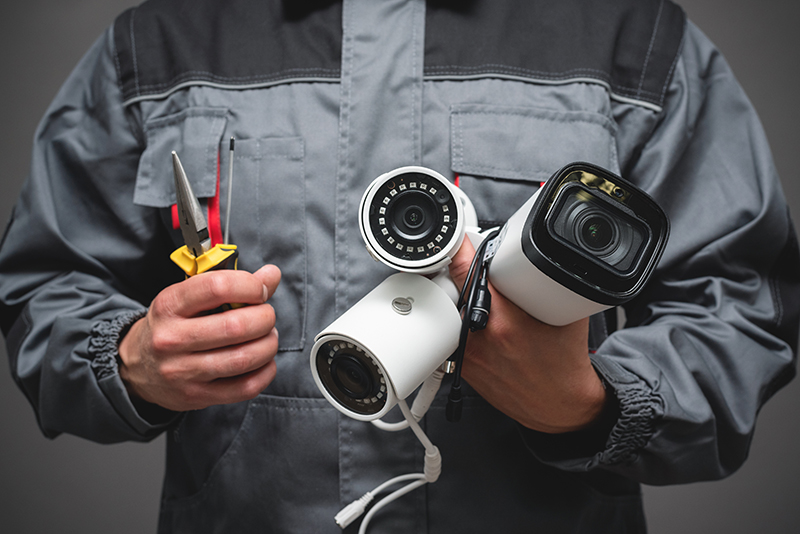Wired vs. Wireless Security Systems: Which is Best for Your Customers?

Published: Friday, 22 August 2025
Security systems are a crucial investment for businesses and homeowners alike, providing protection against theft, vandalism, and unauthorised access. With advancements in technology, customers now face a choice between wired and wireless security systems. Both options have distinct advantages and drawbacks, making it essential to understand which is best suited for different needs. This guide explores the key differences to help electricians, tradespeople, and customers to make informed decisions.
Wired Security Systems
How They Work
Wired security systems connect your security system through physical cables. Your system can include cameras, sensors, and control panels, and the system relies on a direct power source to provide you with the necessary information to keep your property safe.
Pros
- Reliable Connection – Not affected by Wi-Fi interference, ensuring a stable connection
- No Battery Dependency – Devices remain operational without needing battery replacements.
- Ideal for Large Properties – Better suited for businesses, warehouses, or homes with extensive coverage needs.
Cons
- Complex Installation – With a wired system, it requires professional setup with drilling and cabling which increases labour costs.
- Limited Flexibility – Once installed, relocating your security devices can become difficult.
- Higher Initial Cost – Although durable, the upfront costs for wiring and labour can be significant.

Wireless Security Systems
How They Work
A wireless security system will use Wi-Fi, Bluetooth, or a cellular network that connects your security system to a control panel or smartphone app.
Pros
- Easy Installation – There is no need for extensive wiring, helping to make it a more cost-effective option.
- More Flexibility – Your security devices can be easily relocated or expanded, helping you to fill in security gaps when needed.
- Smart Home Integration – Many security systems now sync with mobile apps for remote monitoring and alerts.
Cons
- Signal Interference Risks – Wi-Fi outages or electronic interference can affect the effectiveness of your security systems.
- Battery Powered Devices – Requires regular battery changes to maintain functionality.
- Less Ideal for Large Properties – The larger the property area, connectivity issues can arise with weak signals to impact your security system.

Factors to Consider When Choosing Between Wired and Wireless
- Property Size & Layout
For property size and layout, larger properties and businesses rely more on reliability and will sometimes need 24/7 surveillance. Wired systems are more reliable for this due to the reliable connection and no battery dependency. For smaller homes and apartments, wireless systems are usually more convenient, as they are able to freely move their system around to cover necessary areas of their property.
- Installation & Maintenance
A wired system will require professional installation to make sure your wiring is safe and secure, whereas most wireless systems can be DIY-friendly not increasing the initial cost to have your system installed. The downside to wireless components is their need for battery replacement, while a wired device doesn’t have this issue. This means you will need to keep up to date with your wireless systems more than wired.
- Security Needs
For high-risk businesses (banks, warehouses) will usually prefer wired systems for the reliability and 24/7 surveillance, whereas homeowners usually benefit more from remote access and the flexibility that provides, leaning towards a wireless system.
- Budget
A wired system will have an initially higher installation cost but require less ongoing maintenance, whereas wireless systems are cheaper to install as they don’t need professional installation but over time costs for battery replacements and upgrades will affection your budget.
- Scalability & Future Upgrades
Wired systems are robust; however, due to the need of wires, they can be harder to expand and are not as flexible as wireless systems that allow for easier upgrades and additional features.
Hybrid Security Systems
Depending on your premises and needs, a hybrid system that integrates both wired and wireless could be the best of both worlds. A hybrid system can provide you the reliability of wired for high-priority areas whilst utilising wireless technology for increased flexibility in less critical areas.
Final Recommendations
When it comes to choosing between wired and wireless, there is no definitive answer. Usually for businesses, a wired system is the go-to for its reliability and long-term security, whereas homeowners will usually go for a wireless system for its ease of use, smart home integration, and overall integration. We recommend you fully consider your needs and budget when making your final decision.
Both wired and wireless security systems have their strengths and limitations. While wired systems offer stability and longevity, wireless options provide flexibility and ease of installation. Understanding the customer’s specific needs – property size, security level, budget, and maintenance preferences will help in selecting the right solution.
Looking for high-quality security product? Explore our range of security systems.

